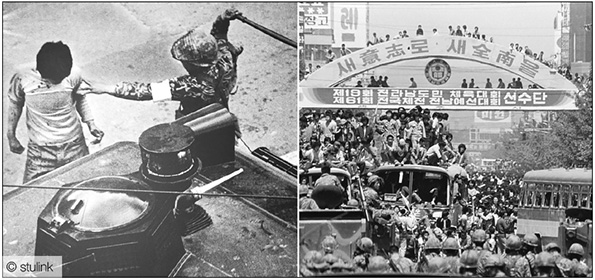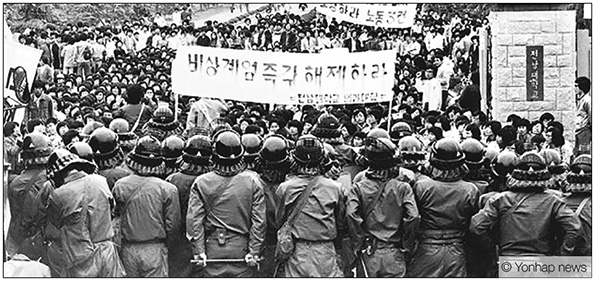It is May again. Time has passed and spring has arrived. Usually, spring is when lots of flowers bloom, leaves sprout, and many people enjoy the season going out for flower viewing and a picnic. However, in the Spring of May 1980 more than 30 years ago, it was time for democracy to bloom and sprout. Let’s take a closer look at the May 18 Democratic Uprising, and discover its historical significance in one keyword, liberal democracy.
This coming May 18 was designated legal memorial day to honor the May 18 Democratic Uprisings. As the name explains, this incidents was democratic resistances to achieve democracy. However, since the Republic of Korea is a democratic republic as specified in the Constitution, why did people have to rise up to obtain their democracy?
May 18 Democratic Uprising
Generally, to understand a “movement” like this, a clear understanding of the historical background is needed. To thoroughly understand the May 18 Democratic Uprising, it is necessary to understand the events leading up to the assassination of President Park Jung-hee. President Park constructed the Yushin regime which was a typical military dictatorship limiting people’s fundamental freedoms and rights including freedom of the press, publication, association, thoughts, freedom of conscience, etc. These are all fundamental to underpin liberal democracy. However, support for the Yushin regime decreased as time passed and the Busan-Masan Democratic Protest occurred in Oct. 1979 with people shouting “abolish the Yushin” and “overthrow dictatorship.” This protest was led by citizens coming out into streets and protesting against the dictator. After, Oct. 26, president Park was assassinated, and during this confusion, Major General Chun Doo-hwan seized control of the military with an illegal military rebellion starting Dec. 12 declaring emergency martial law.
In May 1980, the protest to end martial law, and for Chun Doo-hwan to step down, flooded the nation. However, because the previous government suppressed the people, conditioning them not to freely express their political opinions, citizen’s participation, with the exception of university students, was low. When students and citizens rose up for democracy, the government simply doubled down and expanded martial law to the whole country. The National Assembly was occupied by force, and practically dispersed. Thus, public opinion demanding democratization based on the ideology of the principles of Sovereignty and liberal democracy, which were specified in Constitution, was obviously ignored.

On May 18, there was a violent confrontation between the New Military Forces and the citizens. The casualties were tremendous, however, citizens living outside of Gwang-ju were prohibited from hearing the new because martial law regulated the media and press. Therefore, the citizens outside of Gwangju were denied their freedoms and rights of the press, publication, association, thoughts, and freedom of conscience and so on.
In downtown Gwangju, there were numerous casualties due to continued suppression by airborne troops, but the news reported that, “Not a single student or soldier has been killed in the unrest in downtown Gwangju,” and the government further distorted the facts dishonestly reporting that the citizens attacked the military causing casualties, and that the military could not retaliate on the citizens because they had a duty to protect them. This propaganda was broadcasted in the media and published in the newspapers. Those newspapers reporting the Gwang-ju incident from March 21, depended on the press releases of the martial law command which was biased information. The May 18 Foundation expressed their position “If democracy is to properly take root, the media must do its part’ to prevent the distortion of facts. As they are part of those who are directly involved, they clearly understand that “honest reporting” can lead society to become right and just, and furthermore, it can achieve the development of democracy.
After a year, on May 18, 1981, the May Declaration from Citizens in Jeollanam-do Province, stated that the Gwangju resistance was to be named the ‘Gwangju movement.’ In other words, it was defined as the basis of citizens who aimed for democracy. Yoon Seon-ja, a professor of the Department of History Studies in Chonnam National University, wrote in her article, “The May 18 Democratic Uprising was the most explosive resistance on history of Korean pro-democracy movement to achieve unification of nations and overcome the dictatorship and anti-democratization descended from 1945 after division when the proposition of semi-feudalism and counter-invasion had not been solved after liberation from the Japanese colonial period.
Furthermore, the May 18 Foundation pointed out that the May 18 Democratic Uprising had historical significance in four important aspects. First, the May 18 Democratic Uprising was a civil disobedience against a military dictatorship who seized the power by military coup, and therefore it was a movement that inherited and developed the tradition of anti-dictatorship resistance that has been passed down in modern history. This kind of resistance became a foundation for the June Democratic Uprising in 1987 that led to the constitutional amendment of the direct presidential election system. Second, democracy was consolidated by placing military groups under the control of citizens who are sovereigns of the state. Third, the legality of the armed resistance was recognized by the court determining that it was not an illegal riot and that they had acted according to their right to civil disobedience and resistance. As a result, it was confirmed that citizens’ active resistance to unfair state violence was in line with the constitutional spirit toward liberal democracy. Last, during the ten days of the uprising, the spirit of voluntary cooperation and altruistic sharing of Gwangju citizens proved to be the basic principles of maintaining democracy and social order. Even when the functions of the government, such as the police and administration, were temporarily suspended, no violent incidents occurred in Gwangju, and citizens maintained order through altruistic actions by yielding to each other.

Liberal Democracy
The May 18 Democratic Uprising have a great common denominator of “liberal democracy.” Professor Yang Dong-an, chairman of the Society for the study of modern thought, said that liberal democracy is a combination of liberalism in the governing method of democracy, and that “government does its best to protect people’s freedom, life, property and privacy.” “The development and character of Korean liberal democracy,” included in the ideology of the pro-democracy movement research book, revealed that Korea’s liberal democracy was carried out in a time gap between the time when liberal democracy was universally spread and accepted in western society and the process of flowing into Korean society. Also, it said that liberal democratic ideology allows the modifier “Korean” in harmony with the specific history and social space of Korea, which can be said to be a singularity of Korean liberal democracy.
The May 18 Gwangju Democratization Movement became a springboard of the Korean democratization movement after the incident. The Chun Doo-hwan administration defined the movement as a rebellion and riot, and pro-democracy forces fought against the government to find out the truth about the Gwangju massacre. However, the next generation, who felt indebted to the May 18 Democratic Movement, tried to overcome the ideological limitations of the democratization movement in the 1970s based on the theory of transformation. As such, the May 18 Gwangju Democratization Movement served as an emotional and ideological reservoir in the transformation and democratization movements in the 1980s, and was succeeded by the democratic uprising in June 1987.
The May 18 Democratization Movement re-imagined the constitutional spirit of the Republic of Korea as a “democratic republic” and “the owner of the country is the people” at home and abroad due to the citizens’ voluntary uprising. It is based on the spirit of defending human freedom and natural rights against contradictions, oppression, and injustice of the times and realizing democracy and peaceful unification.
The May 18 Democratic movement have laid the foundation for liberal democracy as repeated protests and struggle, but the institutional ideology of liberal democracy has not yet been fully implemented, which is a task to be solved and developed in the future.
It is an obvious fact that the May 18 Democratic movement played a major role in protecting Korea’s liberal democracy and developing it. The incident have been regarded as meaningful historical events for Korean democracy including the April 19 revolution and the candlelight revolution, and some have been designated as national anniversaries. However, apart from the evaluation, there are lots of rumors such as riots and distortions. The government should quickly find out the truth and remove the regrettable stigma that may ensue.
By Ji Jae-lim | jlim0714@chungbuk.ac.kr
By Jeong Ha-yeon | hayeon0330@chungbuk.ac.kr


 All
All Feature
Feature






 Ji Jae-lim&Jeong Ha-yeon
Ji Jae-lim&Jeong Ha-yeon











